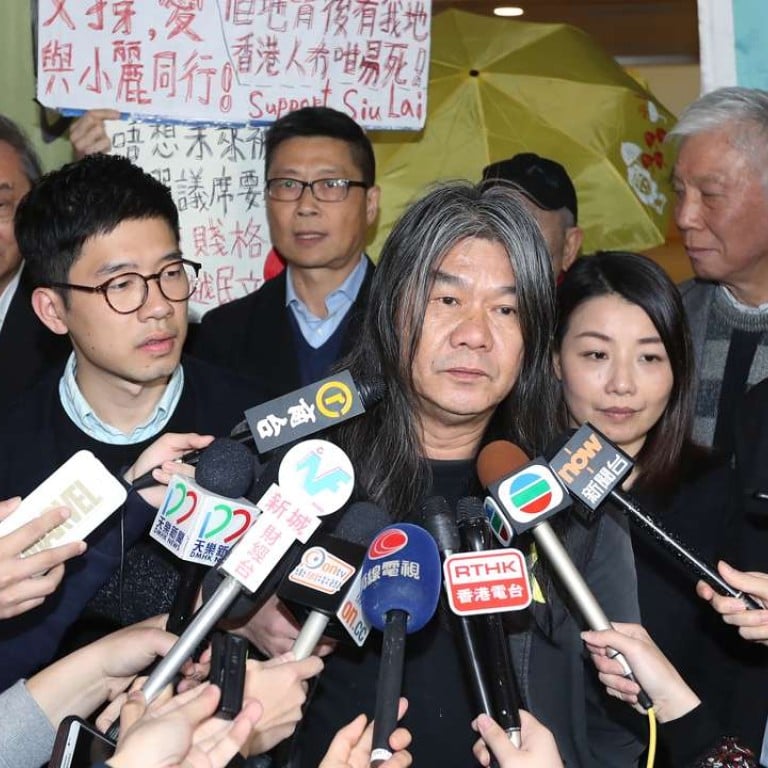
Four Hong Kong lawmakers in oath row urge court to reject bid to unseat them, claiming they have been unfairly targeted
Lawyers call for case to be dismissed, claiming abuse of process, as seven other legislators also added messages when being sworn in but were not challenged
Four pro-democracy lawmakers threatened with disqualification for improper oath-taking urged the High Court on Friday to dismiss the case, claiming an abuse of process arising from selective prosecution.
The unexpected twist came just as the three-day hearing was about to close when lawyers for Chief Executive Leung Chun-ying and Secretary for Justice Rimsky Yuen Kwok-keung failed to explain why they had broadened their case.
Philip Dykes SC, defending former Occupy student leader Nathan Law Kwun-chung, noted that the four were accused of refusing to take their oaths in part because they had added to the prescribed wording, while seven other lawmakers had similarly added words on that same day, October 12, but had not been challenged by the government.
He questioned if there was an abuse of process through selective prosecution, motivated by political reasons.
Johnny Mok Shiu-luen SC, for Leung and Yuen, replied that he was not asked to advise on the other cases. But he added: “These four cases are the clearest ones.”
Mok was referring to Nathan Law, university professor Edward Yiu Chung-yim, lecturer Lau Siu-lai and veteran activist “Long Hair” Leung Kwok-hung.
At issue was whether their actions amounted to a refusal to take their oaths, which would result in their disqualification. Two other lawmakers – Youngspiration’s Sixtus Baggio Leung Chung-hang and Yau Wai-ching – have already been disqualified on such grounds.
Asked outside court if they were worried that their application to halt proceedings might affect other lawmakers, Law replied they only meant to challenge a possible procedural injustice.
Occupy movement founder Chan Kin-man, who raised HK$3.5 million for the four through the Justice Defend Fund campaign, said they would try to help other lawmakers if they ended up in court.
If the defence position is accepted ... members can basically do anything with impunity
The seven lawmakers named are Raymond Chan Chi-chuen, Helena Wong Pik-wan, Eddie Chu Hoi-dick, Lam Cheuk-ting, Shiu Ka-chun, Roy Kwong Chun-yu and Cheng Chung-tai.
The defence has 14 days to submit written applications.
Earlier in the day, Audrey Eu Yuet-mee SC argued that her client, Yiu, thought he was making a valid oath when he added remarks as he had still read all of the original words in his affirmation.
“Why should he deliberately flout the law in order to let down his voters?” she asked.
Eu stressed there was nothing in the regulations that stopped lawmakers from adding words or pledges as long as they did not contradict the prescribed oath.
“The purpose of the Oaths and Declarations Ordinance is to make sure the legislators make those pledges,” she said.
But Mok replied that it was “self-serving” for the defence to argue that oath-taking was a mere formality, and even worse to suggest lawmakers were entitled to distort the oath so long as all the words were recited.
“If the defence position is accepted, the oath-taking members can basically do anything ... with impunity,” he said.
Mok further argued there would be “no limit to the ingenuity” of lawmakers in coming up with novel means to circumvent the straightforward reading of the oath to advocate other things. And he said they would “go to extreme lengths” to do so, like Lau timing herself in preparation before she read her words at six-second intervals.
Mok argued that the law must be kept vague and flexible to be moulded into different situations.
But Professor Johannes Chan Man-mun SC, defending Lau, replied: “If one is expected to obey the law, one has to know what the law is.”
Mr Justice Thomas Au Hing-cheung reserved judgment.


